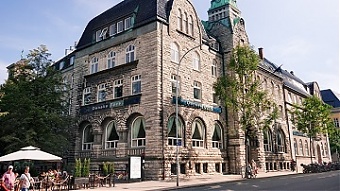Banks, Estonia, EU – Baltic States, Financial Services, Legislation
International Internet Magazine. Baltic States news & analytics
Monday, 29.12.2025, 21:40
EUR 7 bln may have been laundered through Estonian branch of Danske
 Print version
Print version |
|---|
The publication said that the amount, which represents roughly a third of Danske's market value and almost 3% of Danish gross domestic product (GDP), is more than double that previously estimated, according to figures first reported by Berlingske and confirmed by Bloomberg. The sum also makes up nearly a third of the GDP of Estonia.
After the latest allegations, Danske's head of group compliance Anders Meinert Jorgensen, said "it is too soon to draw any conclusions about the extent of the potential money laundering in Estonia."
"That is the reason why we have not ourselves published figures or commented on speculations about potential amounts. On several occasions, however, we have said that the extent seems to be somewhat larger than previously estimated," he said.
Danske Bank last September announced it has expanded its ongoing investigation into the customers and transactions of its Estonian branch from 2007 to 2015. The bank hired Jens Madsen, the former head of Denmark's intelligence agency and fraud squad, to help the bank in its effort to investigate a possible case of money laundering in the Estonian branch of the bank.
The bank in October 2017 was placed under investigation by the High Court of Paris in relation to suspicions of money laundering concerning transactions carried out by customers of Danske Bank Estonia from 2008 to 2011. According to the Danish daily Berlingske, the investigation launched by French authorities into the activities of the Estonian branch of Danske Bank is linked to the case of Russian lawyer Sergei Magnitsky.
Danske Bank at the end of April 2018 announced it is about to stop serving local business and private banking customers in the Baltic countries. The group said that the move was in line with their strategy to focus exclusively on supporting subsidiaries of Nordic customers and global corporates "with a significant Nordic footprint."
Danish Business Minister Rasmus Jarlov says he wants to focus more effort on finding out just how much money Danske Bank made through alleged laundering activities at its Estonian office, with a view to confiscating the funds, Bloomberg reported on Thursday.
"It's crucial to know how big a profit has come from the laundering," Jarlov said, according to newspaper Jyllands-Posten. "It's obviously not satisfactory that large sums of money were made laundering funds and that that money is still with Danske Bank. This offends my sense of justice, and everyone else's."
Jarlov told local media that the Danish Financial Supervisory Authority is opening a new investigation into the Danske scandal. That follows revelations late on Tuesday that the scope of the case was considerably bigger than previously thought.
Allegations of money laundering against the bank are not new. The Berlingske newspaper has been publishing a steady stream of revelations for more than a year on the extent to which Danske's Estonian office was used as a laundromat by entities in Russia, Moldova and Azerbaijan. But the latest figures shocked the market, and shares in Danske fell on Wednesday, making the bank the worst performer in the Bloomberg index of European financial stocks. Danske opened lower on Thursday in Copenhagen trading.








 «The Baltic Course» Is Sold and Stays in Business!
«The Baltic Course» Is Sold and Stays in Business!

